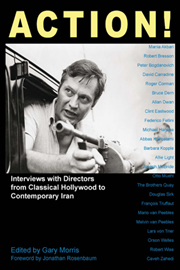Book contents
- Frontmatter
- Contents
- Foreword, by Jonathan Rosenbaum
- Editor's Preface
- Acknowledgements
- Introduction: The Art and Craft of Interviewing
- I Going Hollywood: Masters of Studio Style
- II Tickets to the Dark Side: Festival Favorites
- III Blows Against the Empire: Indie Godfathers
- IV Edgeplay: Avant-Garde Auteurs
- V Women in Revolt: Artist-Activists
- VI The Canon: Brilliance without Borders
- 16 “For a Kind of Pleasure”: Federico Fellini
- 17 Transcendental Style, Poetic Precision: Robert Bresson
- 18 “The Fruitful Tree Bends”: Abbas Kiarostami
- 19 Alter Ego, Autobiography and Auteurism: François Truffant
- Contributor Biographies
17 - Transcendental Style, Poetic Precision: Robert Bresson
from VI - The Canon: Brilliance without Borders
Published online by Cambridge University Press: 05 March 2012
- Frontmatter
- Contents
- Foreword, by Jonathan Rosenbaum
- Editor's Preface
- Acknowledgements
- Introduction: The Art and Craft of Interviewing
- I Going Hollywood: Masters of Studio Style
- II Tickets to the Dark Side: Festival Favorites
- III Blows Against the Empire: Indie Godfathers
- IV Edgeplay: Avant-Garde Auteurs
- V Women in Revolt: Artist-Activists
- VI The Canon: Brilliance without Borders
- 16 “For a Kind of Pleasure”: Federico Fellini
- 17 Transcendental Style, Poetic Precision: Robert Bresson
- 18 “The Fruitful Tree Bends”: Abbas Kiarostami
- 19 Alter Ego, Autobiography and Auteurism: François Truffant
- Contributor Biographies
Summary
The following interview took place over a five-hour period at Bresson's (1901–1999) home on Île St Louis in Paris, shortly after L'Argent (Money) shared the 1983 Grand Prize for creative cinema at the Cannes Film Festival. It was conducted in both English and French, all of which I myself later translated. Parts of this interview have previously been published in other places; this is the first appearance, in print, of the entire, uninterrupted conversation between me and M. Bresson.
If it's all right with you, M. Bresson, I'd like to organize this interview around four films of yours: your latest, L'Argent, and three others of which I myself am particularly fond–Au hasard Balthazar [1966], Pickpocket [1959], and The Trial of Joan of Arc [1962]. We can digress as we like, of course, but our discussion will revolve around these four films. Okay?
Yes, that's fine. Why not?
Let's go back in time to 1966, the year in which Au hasard Balthazar was released, and then gradually return to the present with L'Argent. Where did you get the title Au hasard Balthazar, anyway?
The title came from my desire to give the donkey a Biblical name. So I named him after one of the Three Wise Men. The title itself is the motto of the nobles of Baux, who claimed to be heirs of the Magie Balthazar; their motto was indeed “Au hasard Balthazar.”
- Type
- Chapter
- Information
- Action! , pp. 265 - 298Publisher: Anthem PressPrint publication year: 2009
- 1
- Cited by



